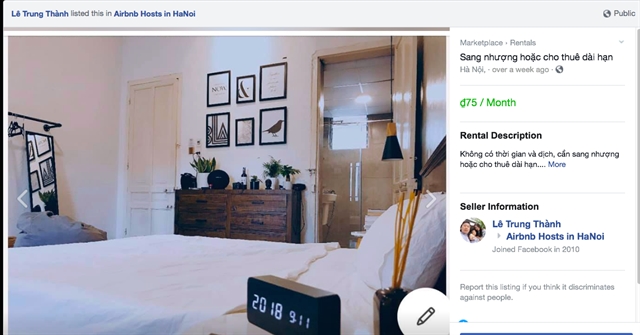 Economy
Economy


|
| An AirBnB host offers his place in Hà Nội for long term rental. — From the group Facebook |
HÀ NỘI — There are many problems associated with COVID-19, but one major issue caused by the global pandemic is its virtual destruction of the travel industry.
Tourists simply stopped coming, and now Việt Nam has completely pulled the plug on all international arrivals, many small businesses are left counting the cost. None more so than the short-term house share industries, like Airbnb.
In 2019, the short-term rental industry catering for tourists experienced a major boom in Việt Nam since the concept came into play three years ago.
A survey by Grant Thornton, one of the world’s leading independent assurance, tax and advisory firms, showed that in 2019 Airbnb grew impressively with 30,000 additional accommodations sprouting up in Việt Nam.
In the first few months of this year, as COVID-19 takes a firm hold around the world, the industry has nose-dived.
On March 18 tourist visas were suspended then on March 21 all visitors, barring diplomats and those in certain positions, were told they could no longer come to Việt Nam.
This has hit Nguyễn Kim Oanh particularly hard.
She has a five-storey building Ngọc Hà Street, near the Presidential Palace, where she offers five rooms on a short-term rental basis.
Normally, due to its ideal locations, her rooms are always occupied and Oanh has to tell potential customers she is fully booked. Not anymore.
Now, she tells Việt Nam News: "Tourists have cancelled all reservations because they could not get a visa and many are also afraid of travelling.”
She has not had a single guest in the past week. And more than 80 per cent of her guests due to arrive in the next two months have cancelled.
Oanh has also had to take her own steps, despite the financial implications, refusing to take new bookings to avoid the potential spreading of the virus.
“They don’t want to be at risk of transferring the virus from an unknown source,” she said.
“I don’t think I will be able to use my house for Airbnb for the next two to three months.”
Oanh is not alone. In a community group of more than 35,000 local Facebook users running Airbnb services, many share the same problem.
According to data, the occupancy rates of short term house-sharing still remained about nearly 70 per cent in February but demand has plummeted this month.
Airbnb allowed all guests who booked rooms from March to April 14, to cancel their booking free of charge.
Brian Chesky, Co-Founder and CEO of Airbnb when announcing the new policy said they knew many hosts depended on revenue from Airbnb with around half relying on the income to pay their mortgages.
He did say the company was working on a number of new ideas in an attempt to support hosts during these troubled times.
However, until now there has not been any further announcement from the company.
Longer rent is an alternative solution
So, instead of a short-term rent, some local Airbnb hosts are looking for longer contracts to find more stable revenue.
This is something being considered by Oanh.
She said: “In February, a company asked to rent a room, albeit at a much lower rate than if I was to offer the room on a short-term deal.
“Although I would lose at least VNĐ15 million(US$650) a month, I accepted their booking.”
A deposit has been paid, but Oanh is still concerned.
“The new tenant will move in next month,” she said.
“I really hope that they don’t change their minds. Other landlords I know have had cancellations after deposits have been paid.”
Nguyễn Thị Toàn, owner of a house in Yên Phụ Street has a similar story to tell.
After Tết, she reduced prices by a third, but still, tenants have had second thoughts about staying in her rooms.
Toàn told Việt Nam News: “I wish I would have eased the house for the longer term. If I agree a-year-long contract I would not be facing the losses I am now.”
From now on she is only looking for longer term deals.
Đinh Gia Huy told wrote on Facebook: “There is no way to keep calm. If you change the renting type now, it is difficult to run short-term renting when the market is back.”
But Huy also shares he will find other solution if the pandemic continues.
Some of those on the group are clearly struggling, resorting to selling off home appliances to make ends meet.
Until the threat lifts, many will continue to suffer, as tourists have no choice, but to stay away. — VNS




